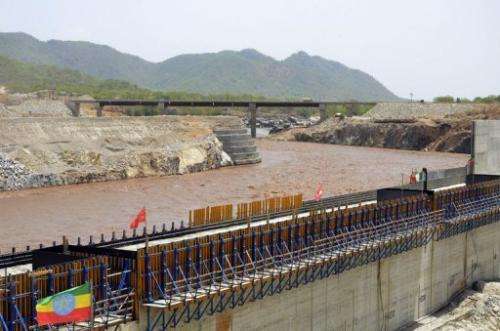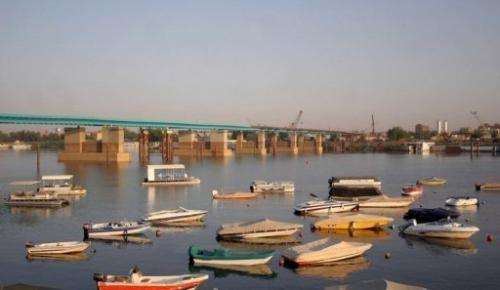Egypt eyes Nile deal with Ethiopia

Egyptian President Mohamed Morsi is facing heavy pressure to secure a negotiated settlement to a bitter dispute with Ethiopia over the sharing of Nile waters.
There has been tough rhetoric from Morsi and other Egyptian officials in recent weeks about Ethiopia's diversion of a section of the Blue Nile for a dam project.
"If a single drop of the Nile is lost, our blood will be the alternative," Morsi said in a speech on Monday.
A government official told AFP Egypt would negotiate a solution to the intensifying dispute.
"We are in the midst of negotiations," said the official, on condition of anonymity because of the sensitivity of the topic.
Morsi's stern tone, he added, was meant to emphasise "that there is a commitment to our rights," denying that the president had intended to appear bellicose.
"For us it is a matter of life or death," he added.
An Egyptian government report concluded the proposed dam on the Blue Nile could affect the supply of water for irrigation and hydroelectric power generation.
Almost a year into his first term of office, Morsi is beleaguered by simmering opposition that has seized on the dam project as a failure of his much touted foreign policy.
In the Islamist-dominated senate, lawmakers heckled Prime Minister Hisham Qandil in a rowdy session on Monday after he finished a speech in which he warned the dam would affect the country's principal water source.
In one of his first steps, Morsi had convened a meeting with party leaders, including those from the opposition, calling for a national front to tackle the dam.

The meeting, aired live on television, backfired as the politicians, apparently unaware they were on air, proposed supporting Ethiopian rebels or sending agents to sabotage the dam.
But some opposition leaders have rallied around the president's call for unity, saying the dam's threat requires a national front.
"It is not a matter of blame now," said Amr Mussa, who lost to Morsi in a presidential election last June.
"It is much more serious," said the former foreign minister and head of the Arab League.
"The solution must stem from an understanding between Egypt, Sudan and Ethiopia," he told AFP.
"It is necessary to create the right political environment to reach such an understanding."
The dam project has been significantly expanded from past Ethiopian plans when Egypt's Hosni Mubarak, overthrown in a 2011 uprising, was in power.
When Mussa was foreign minister, between 1991 and 2001, the project was far more modest, he said.
"At the time, there was talk of a dam that was six times smaller, hence... it was six times smaller, therefore six times less threatening," he said.
Morsi had come to power pledging a new chapter in relations with Nile Basin countries, which felt alienated by Mubarak's opposition to upstream projects.
The Islamist president will try to contain the crisis through talks, said Essam al-Erian, the senate leader of the Freedom and Justice Party, the Muslim Brotherhood political wing that backed his candidacy.
"The choice is of negotiations, and cooperation," he told AFP. "It will happen."
If talks fail, Egypt could resort to international arbitration, said Hatem Begato, the legal and parliamentary affairs minister.
Ethiopia has already begun diverting the Blue Nile some 500 metres (yards) from its natural course to construct the dam.
The Blue Nile joins the White Nile in the Sudanese capital Khartoum to form the Nile, which then flows through Egypt.
Egypt says its "historic rights" to the Nile are guaranteed by two treaties from 1929 and 1959 which allow it 87 percent of the Nile's flow and give it veto power over upstream projects.
But a new deal was signed in 2010 by other Nile Basin countries, including Ethiopia, allowing them to work on river projects without Cairo's prior agreement.
© 2013 AFP




















